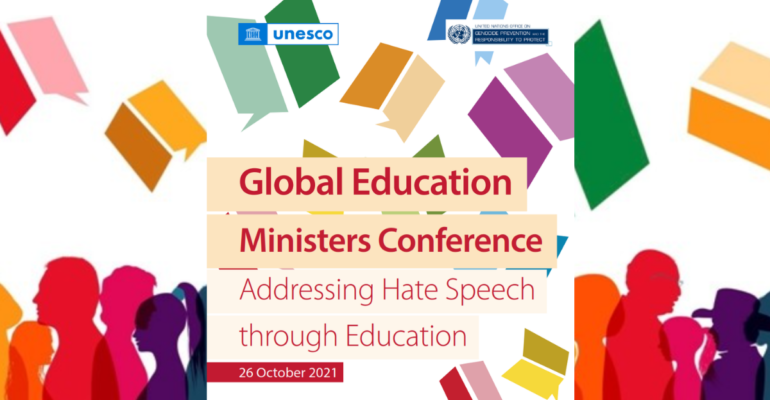Blog by Evelyne Para, SI United Nations Representative at UNESCO.
On 26 October 2021, a world conference of education ministers was held online, lead by the Secretary-General of the United Nations, António Guterres, and the Director-General of UNESCO, Audrey Azoulay. The “Addressing Hate Speech Through Education” conference was organised as part of the strategy to strengthen the UN response to the global phenomenon of hate speech, in order to mobilise and solidify the commitment of Member States to fight against such hate speech, both online and offline, through more effective educational measures.
What is hate speech?
The UN defines hate speech as any type of communication, whether oral or written expression or behaviour, using derogatory or discriminatory language against a person or a group because of their identity – often because of their religious affiliation, ethnicity, nationality, skin colour, ancestry, gender or other factors that make up identity. Often hate speech is both the result and the cause of intolerance and hatred and can in some cases be disparaging and divisive.
In an excellent video, ‘No one is born to hate’, UNESCO shows that education can play a fundamental role in combating hatred, and helping to counter the emergence of violence targeted at certain groups of people.
Hate speech is on the rise worldwide, with the potential to incite violence, undermine social cohesion and tolerance, and cause psychological, emotional and physical damage. Because history has shown us that genocides and other atrocities have often started with words, countering hate speech today is our collective responsibility in order to prevent future violence.
Moreover, disinformation is used to target specific populations and countries. Recently, various groups have been falsely accused of spreading the COVID-19 virus and conspiracy theories have been utilised for political ends, exacerbating socially entrenched prejudices and increasing vulnerability, stigma and discrimination of those perceived to be “other”.
This situation has led UN to issue a Guidance Note on Dealing with and Combating Hate Speech Related to COVID-19.
The main statements
During this conference, the education authorities at the highest level of many countries (France, Italy, Finland, Austria, Mali, Portugal, Mexico, Korea, Ecuador, Canada, China, Egypt, etc.) spoke out to forge a consensus on key priorities and coordinated action. Almost 60 education ministers attended the event and many more contributed video messages.
“This hatred is not new. But what has changed more recently is the influence and scale of social media platforms, which have become an echo chamber that amplifies hate speech… We must therefore step up our efforts to combat all forms of hate speech in schools, by helping teachers to solve these problems and by developing appropriate pedagogical approaches”.
– Audrey Azoulay, UNESCO Director-General.

The United Nations Hate Speech Strategy and Plan of Action recognise education as a fundamental tool to address the root causes and drivers of hate speech, and to enable transformative change for peaceful societies, inclusive and fair for all, in accordance with the 2030 Agenda. Opening the conference, António Guterres warned that “hatred takes root in the breeding ground of ignorance of the history facts, science and human qualities which unite all people.”
He also said, “Social media is a global megaphone for hate, lies and misinformation spreading around the world at the push of a button. A questionable web page or an anonymous message can call into question decades, if not centuries, of work, thought, study and careful analysis by scientists, historians or other experts.”
What can we do?
Hatred is dangerous for everyone, and therefore combating it must be everyone’s job. A legal answer is not enough. It’s through education that we will develop critical thinking and deconstruct prejudices.
This conference presented key findings regarding education policies contributing to continued and long-term efforts to address and counter the threats created by hate speech that every society faces. Fighting against hate speech is a multi-layered endeavour that involves tackling its causes and drivers, preventing it from becoming violent, and dealing with its wider societal consequences.
Strengthening education systems to increase learners’ resilience and awareness of hate speech, as well as education about their responsibilities and rights online and offline, are at the heart of UNESCO’s educational initiatives in order to provide sustainable solutions. In particular, UNESCO is focusing its efforts on the promotion of global citizenship education, based on three areas of learning – cognitive, socio-emotional and behavioural – to instil respect for diversity and for human rights, social justice, gender equality and environmental sustainability.

